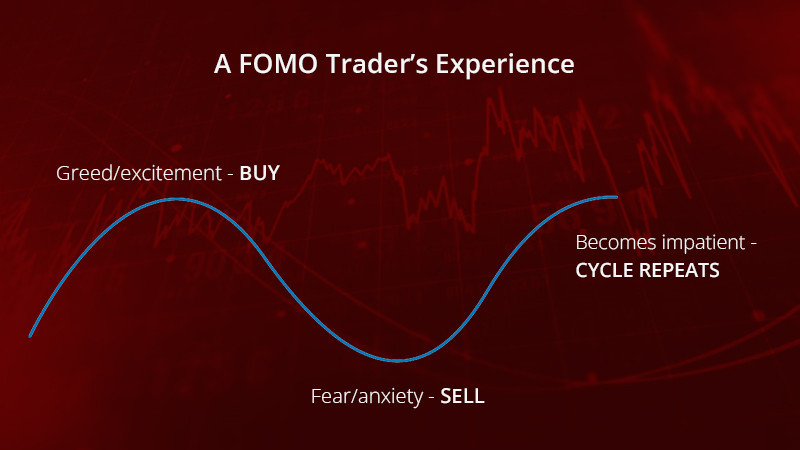
In trading, the psychological element is just as important as knowledge, skills, and experience. It can be difficult for novice traders to overcome their instincts and trade with a cool head.
Nevertheless, this skill must be learned. Undue emotions often prevent traders from entering and exiting positions on time.
This article will explain the psychological factors impacting trading. You can learn more about different trading strategies and their basic concepts by reading the article "what is trading".
What is FOMO trading?
In trading, FOMO (Fear of Missing Out) refers to a fear of missing out on potential profits.
Traders affected by FOMO often do the following:
- They always closely follow prices of different assets like stocks, crypto, currency pairs, and other instruments.
- They don’t want to miss any news that can potentially affect asset prices.
- They use their smartphone all the time.
- They check messages and alerts on every device.
- They are scared to lose their phone and not have access to information;
- They reply to messages right away because they don’t want to miss anything.
- They always follow what’s new on social media, watching both their profile and other users;
- They get unhappy or angry if they don’t buy an asset that goes up;
- They want to go to cool events, make a lot of money and spend it on leisure.
FOMO is very similar to envy. A person believes that their friends or acquaintances have a better life than they do, have more opportunities, earn more money, and so on. However, there is another addiction here besides envy.
It is a constant desire to follow everything that happens to other people due to the fear of missing out on some important news or events. Therefore, they have to constantly monitor their gadgets.
Another important difference is that FOMO directly depends on freedom of choice. Nowadays, the opportunities of a person are almost limitless, and it can be quite difficult to make a choice.
Therefore, if this choice does not yield a desirable result, it leads to disappointment. FOMO leads to unrealistic expectations and a desire to get a profit quickly.
What causes FOMO
The popularity of social media is one of the main causes of FOMO. In the past, news about any events spread very slowly, from several days to several weeks.
Now people can get information instantly via an app on their smartphone, and observe all events live. At the same time, people tend to look at their lives differently because they are not involved in the events that happen in other people's lives.
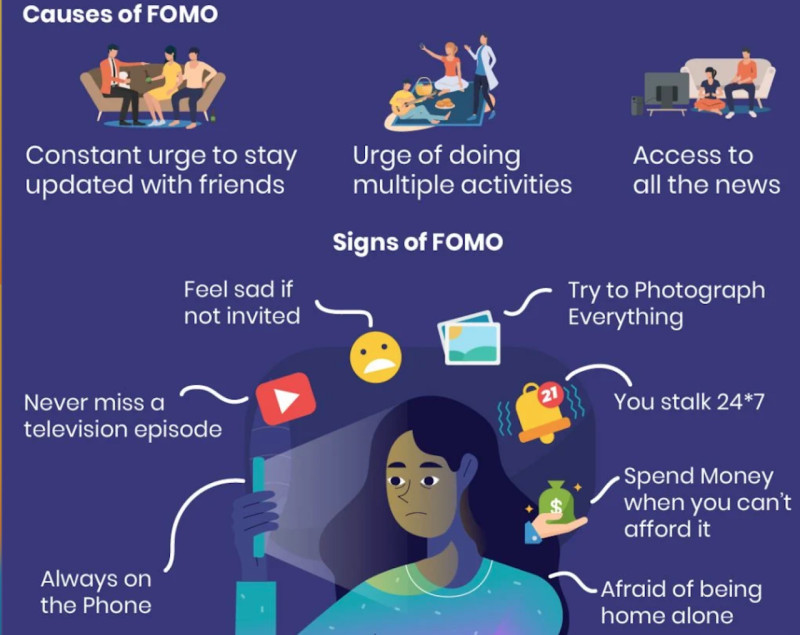
People affected by FOMO feel lonely and believe that their life is not as interesting and fulfilling as that of their friends or acquaintances. They think that they are wasting their lives.
At the same time, the main cause of FOMO is dissatisfaction with one's own life and achievements.
This is particularly aggravated by loneliness, the lack of strong family and friendship ties outside social media. Without communicating with people offline, one might feel that their life is not as rich and fulfiling as those of their peers.
When a person is unable to fulfill basic socialization needs, they begin to feel like a pariah. They may feel inferior to others, and that other people are more successful and happier than they are.
The resulting anxiety, which can gradually intensify, becomes dangerous for the mind. The person's overall productivity deteriorates, which can lead to depression.
How FOMO affects traders?
Let's take a closer look at how FOMO affects trading in particular. It can occur in different situations.
Every trader should monitor the market in order to find the most profitable entry points. However, a trader should not be obsessed with it.
Many traders are now seriously worried that they did not buy BTC when Bitcoin costed a couple of dollars. After all, this could have produced colossal profits by now.
Different situations can give rise to doubt and anxiety. For example, a trader might not have opened a position at the very start of a trend or might have ignored a promising asset when it started to surge.
Sometimes a trader might close a long position prematurely when the asset is still rising. Alternatively, the trader may want to buy the asset at the best price, only to see it decrease even more after the purchase.
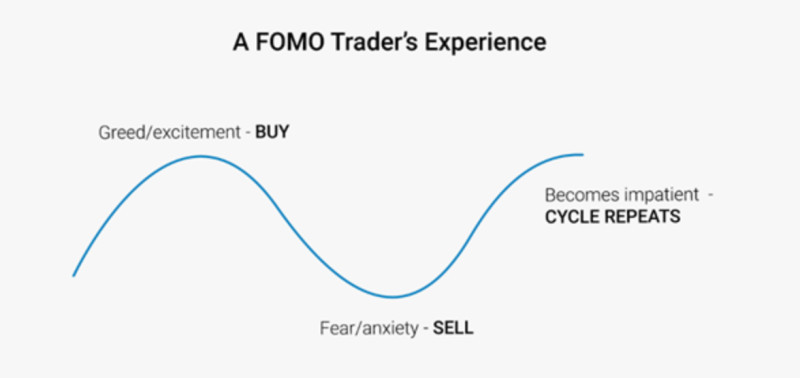
In such a situation, one might feel guilty about not taking advantage of the opportunity or not using it properly. Furthermore, it can only get worse when the asset continues to rise or fall. When the trader continues to follow the asset in question, they might get even more frustrated.
At the same time, no one can guarantee that the trader will be able to make a bigger profit by opening a position at a different time. The market is unpredictable, and asset moves cannot be accurately foreseen.
That is why one must always be ready to suffer losses besides getting a profit. not only to gain profits. All brokers warn about it when you open a trading account. Trading always involves a certain risk.
How to deal with FOMO trading?
It is only natural for people to be influenced by their emotions. Although they are capable of rational thought, their actions are still often guided by emotion.
When it comes to dealing with FOMO in everyday life, people are advised to "clean up" their social networks, spend more time with family and friends, have face-to-face communication, be thankful for the things they have, and focus on positive experiences.
There are also some guidelines in trading to avoid the effects of regret over missed profits. Let's look at them in more detail:
1. Do not think about the past. All that occurred in the market before no longer affects the present. One cannot move back in time to carry out a missed trade. You should not beat yourself up over it is not worth it.
Successful investors use technical and fundamental analysis to open positions. They assess the current situation of an asset and try to predict its future performance, and then make a decision based on that.
2. Go against the crowd. One should not blindly follow other traders. This can be tricky because FOMO can get stronger when you're not investing in a rising asset.
Often long positions are particularly successful during sell-offs and panic, while the most profitable short positions can be opened during boom times, when everyone is trying to go long on the asset.
3. Set goals. In trading, it is very important to have a trading strategy and to follow it closely. It should include rules on closing positions.
For example, it should note when to close a position once it reaches its target level. You should not pay attention to its subsequent moves in either direction.
4. Learn to be patient. If there is no good investment or trading opportunities, you should wait. Furthermore, you can diversify your portfolio and add new assets if the ones you’re holding are not profitable enough.
FOMO trading
There are a number of other suggestions on how to avoid the effects of FOMO. Trying to trade under its influence can be very dangerous.
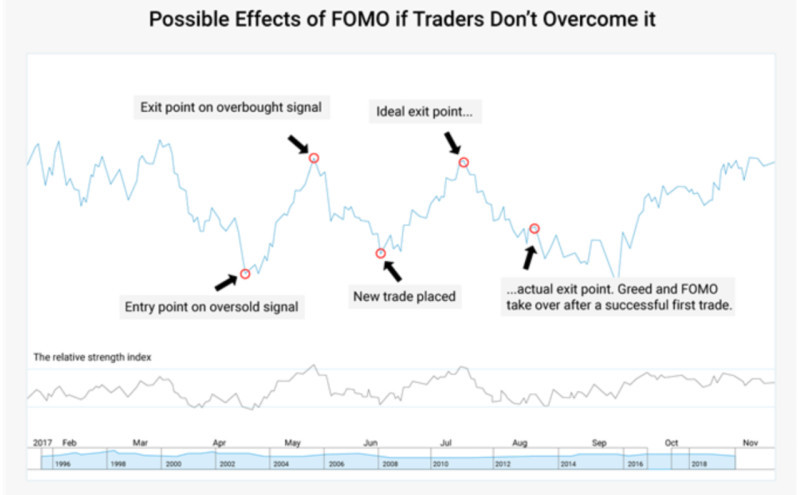
One way to avoid FOMO is to limit your losses by defining a fixed acceptable loss for a certain period of time, such as 5% per week.
Once the limit is reached, you should stop trading until the beginning of the next week.
This strategy is common among investment companies. Once traders reach a certain level of losses, they are simply disconnected from the trading platform for a period of time. After this break, they resume trading.
Another way to fight FOMO is to limit the number of trades which will be carried out over a certain period of time, such as five transactions per week, for example.
When this limit is reached, you should also stop trading until the beginning of the next week. Beginners are recommended to set a limit of even one trade per week.
In this situation, the trader is aware that they have only one chance. Then, they analyze the market more thoroughly and do not rush when looking for an entry point.
Many people think that more trades equals more profit. However, very often it is not the case.
Everyone has their own trading strategy, and you must take into account your individual traits. Some people are more suitable for short-term trading with more transactions, others are more suitable for middle- and long-term trading with just a few transactions per month.
FOMO and FUD
There is also another term which is closely connected with FOMO - FUD (Fear, Uncertainty, and Doubt).
FUD is a psychological manipulation technique that is used to make a large number of people anxious about the future. The key element is the way the information is presented rather than the truthfulness of the information itself.
In trading, FOMO and FUD interact with each other over a number of stages:
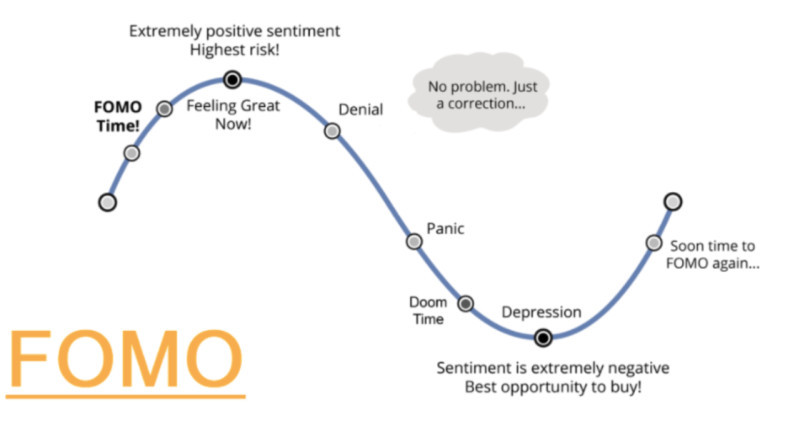
- There is an uptrend in the market, the asset is increasing and becomes increasingly trending with the help of FUD. The goal behind the release of the information is to make every trader feel confident in their actions.
- Even though entering the market is clearly unreasonable, traders go long on the asset at its peak, because they are afraid of missing out on a profit opportunity.
- After a pullback in the market, traders perceive it as a correction and do not close the obviously unprofitable position.
- However, it turns out to be a downtrend, and at the very bottom traders realizes that the profit opportunity was fake. However, in that situation, they can only blame themselves.
- Panic is replaced by a sense of depression, until another excellent buy signal kicks off FOMO once again.
Overcoming FOMO
Here are some additional tips on how to overcome FOMO when trading:
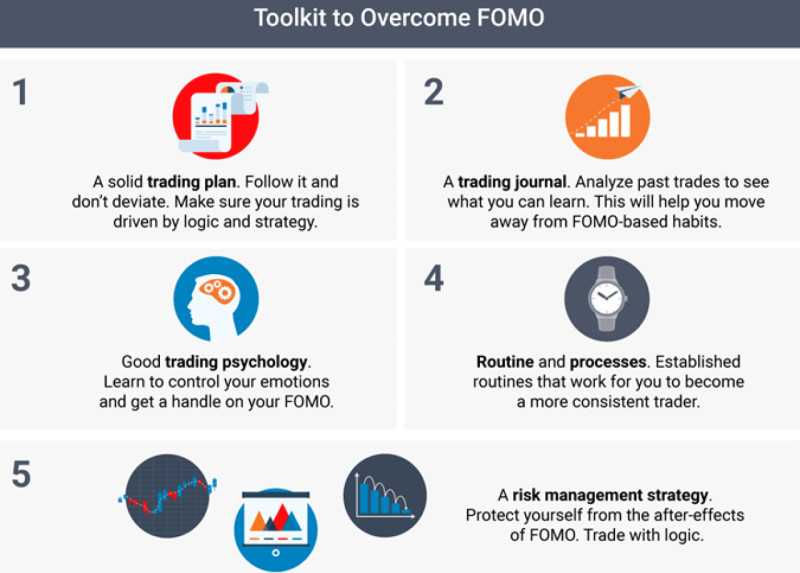
- Thoroughly analyze the market before opening a position. It doesn't matter how many trades you are opening. You should prepare for each of them meticulously.
- Developing your own trading strategy with clear rules for entering the market and risk management is essential. Strictly adhere to your own rules for opening and closing positions, regardless of emotional impulses.
- Keeping a trading journal is also a good idea. Nowadays, it may seem outdated. However, this practice helps analyze the history of previous trades and learn from mistakes.
- Await the next opportunity. The market is constantly moving, and with every missed opportunity, a new one will arise. Not every trade can or should be profitable.
- Communicate with other traders. There is a wide range of forums and specialized groups on messaging platforms and social networks where traders share their experiences and opinions. Such communication can provide reassurance and prevent feelings of isolation.
- Try changing your perspective on failures. Consider an unsuccessful trade as a signal to take a break and shift focus to other activities. Instead of succumbing to FOMO, try embracing JOMO (joy of missing out). We will discuss this further in the following sections.
What is JOMO?
JOMO (Joy of Missing Out) is a new philosophy that is completely opposite to FOMO.
Its followers urge people not to envy others or feel let out. Instead, they propose focusing on the good things present in your life and trading activities.
The key aspect of this philosophy is to concentrate on the positive events and appreciate what one already possesses. This allows individuals to feel more positive and motivated.
In the market, there are always new developments, emerging opportunities, and attractive offers. However, traders who succumb to FOMO often make impulsive decisions that ultimately lead to losses.
It is important to try and avoid the influence of emotions and trade strictly according to one's trading strategy. This enables making informed decisions and avoiding the pitfalls of FOMO.
Traders who embrace the JOMO philosophy in trading act more calmly and confidently. They do not chase every trading opportunity but carefully select those that align with their trading strategy.
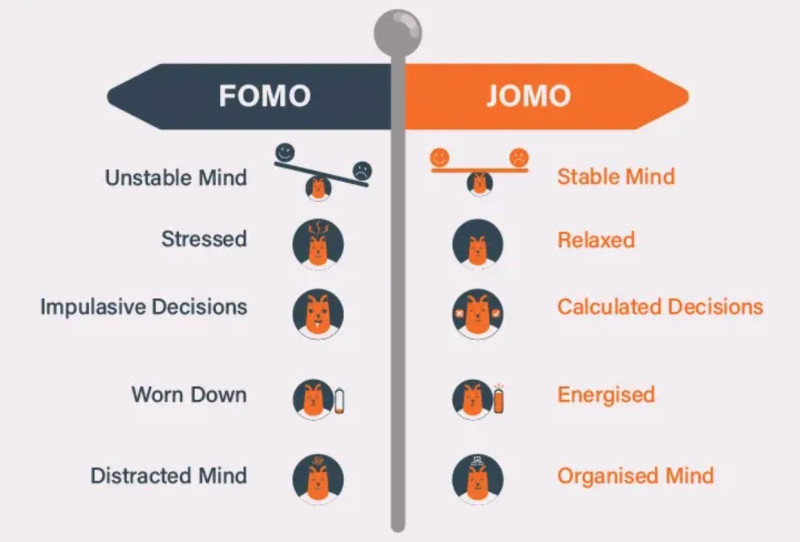
Key differences between JOMO traders and FOMO traders include:
- Having a personal trading strategy and adhering strictly to its rules.
- Using critical analysis when considering trade opportunities instead of blindly following the crowd.
- Having confidence in possessing all the necessary information for conducting trades.
- Automating certain trading processes to free up time for more important matters.
How to apply JOMO when trading
By following a few simple steps, you can overcome the FOMO effect. Trading using JOMO can be much more effective. Here is how you can apply JOMO principles to your trading strategy:
- Develop a well-defined trading plan. It has already been mentioned this several times in this article. It is indeed particularly required to keep your peace of mind, confidence, and achieve success in trading.
- Use reputable and professional sources of financial information. Nowadays, a vast amount of information on various topics can be found on the Internet, but not all of it is reliable. Traders should constantly keep track of news and important events in the world of finance, but they should obtain such information from trusted sources. This is especially true for forecasts and signals, which beginner traders may utilize.
- Learn to filter information. One cannot avoid all news and information out there. However, when reading reports by different experts, it is important to interpret the received information correctly.
- Determine the most suitable market analysis methods for you. Market situations can be analyzed using various approaches, such as by using technical indicators, chart patterns, or candlestick patterns. Each trader needs to find the method that fits them the best and adhere to it.
- Choose your preferred style when opening trades: more aggressive or conservative. This will influence both the number of trades and entry points. Here, you should make the decision based on your personality traits.
- Allow yourself time to rest. All traders, including professionals, need breaks from time to time. You should take a break to reduce stress and look at trading with fresh eyes, seeing familiar things from a different perspective.
FOMO and YOLO in trading
Another quite popular way of thinking, especially among young people, is YOLO, which stands for "You Only Live Once." It calls for living in the present, seizing every opportunity without putting off everything for the future. Young people who follow it usually don't save money or buy real estate.
YOLO and FOMO are closely correlated. According to YOLO, one should live for today and spend everything. FOMO intensifies these feelings by provoking a fear of missing out on the current opportunities.
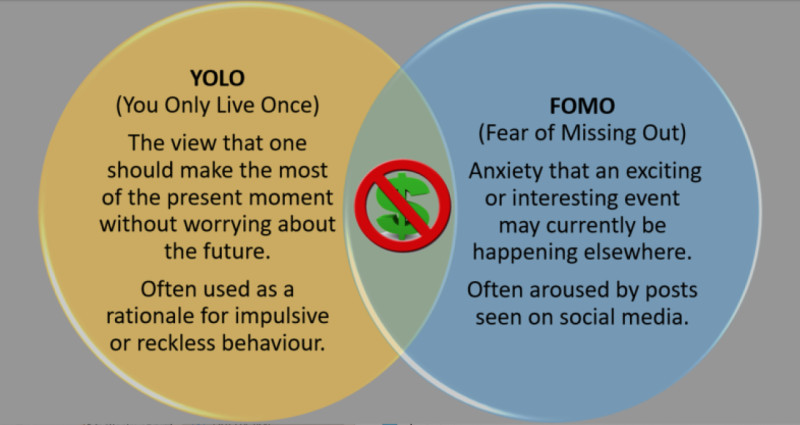
In the world of finance, these two concepts also intersect. A trader or investor under the influence of FOMO makes emotional decisions driven by this fear out rather than careful calculations. On the other hand, when a market participant, after managing to earn substantial profits, doesn't reinvest or continue trading but starts spending the gains on a lavish lifestyle and possibly unnecessary luxuries, it is due to YOLO.
Both of these effects are influenced by economic instability, financial crises, concerns about a possible default, and other significant disruptions that undermine confidence in the future. In such circumstances, it may seem reasonable to spend everything here and now.
The interaction between these two effects became clear when inexperienced users entered the market during the coronavirus pandemic. Previously, they earned money through sports betting, but with the cancellation of most sporting events, that opportunity was no longer available.
By the way, the assumption that trading is some kind of game or lottery where random bets can lead to winning is a very common misconception. However, no matter if you’re trading stocks or foreign currencies, you still need to make careful preparations before each trade market, requires careful preparation for each trade.
Conclusion
In this article, we have examined the FOMO effect, which makes trading more stressful and intense and often leads to failure. This is primarily due to the fact that trades are executed based on emotions and stress, rather than rational calculations.
A person susceptible to the influence of the FOMO effect fears missing out on profitable opportunities and experiences strong disappointment when others trade better than they do.
FOMO trading is closely connected with YOLO, a way of thinking that calls for living for today and not thinking about the future. When it comes to finance, this approach leads to people spending all the money instead of accumulating it.
These two effects are connected. FOMO encourages making reckless trades under the influence of the crowd, while YOLO leads traders to spend all their earnings without thinking about reinvesting them to make more money.
To counterbalance FOMO, a new concept of JOMO was created which urges people to focus on the good things and not on lost opportunities.
Traders who embrace the JOMO philosophy in trading act more calmly and confidently. They do not chase every trading opportunity but carefully select those that align with their trading strategy.
You may also like:
Standard deviation trading strategy








 Back to articles
Back to articles

